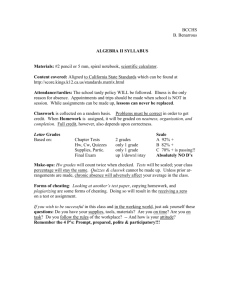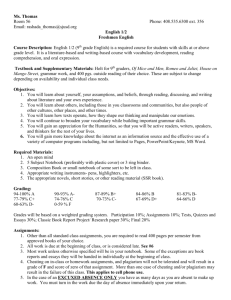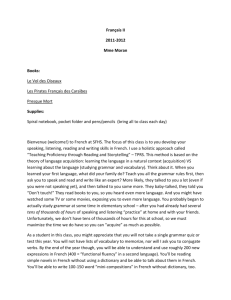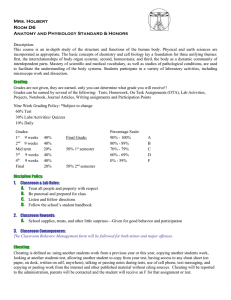junior health overview
advertisement
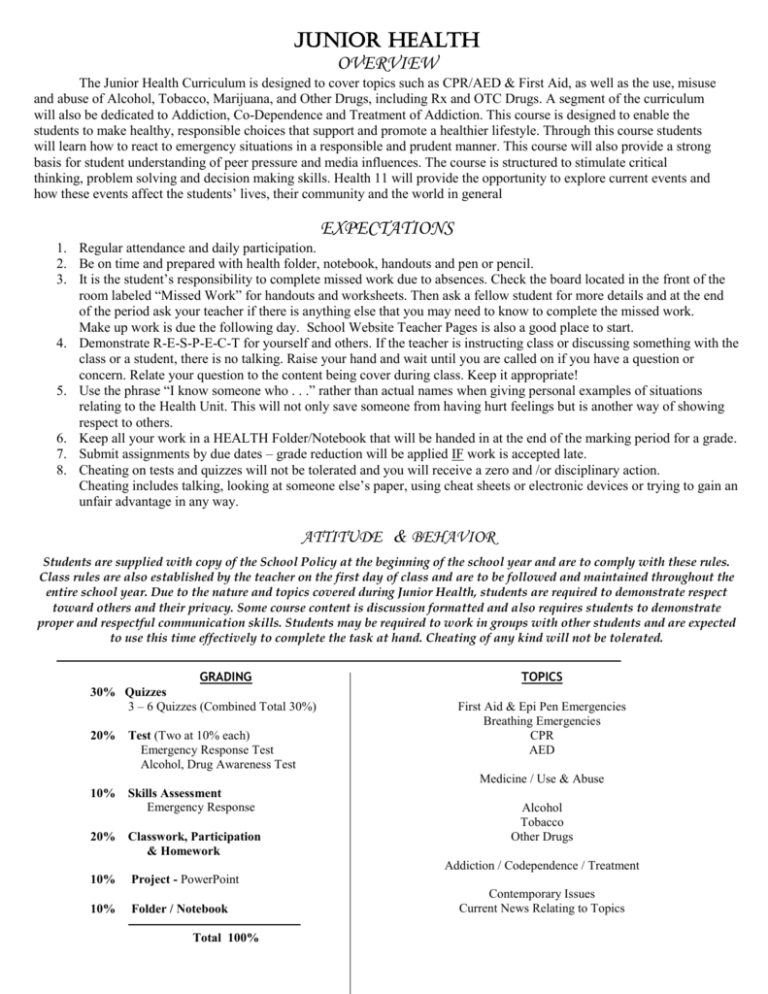
JUNIOR HEALTH OVERVIEW The Junior Health Curriculum is designed to cover topics such as CPR/AED & First Aid, as well as the use, misuse and abuse of Alcohol, Tobacco, Marijuana, and Other Drugs, including Rx and OTC Drugs. A segment of the curriculum will also be dedicated to Addiction, Co-Dependence and Treatment of Addiction. This course is designed to enable the students to make healthy, responsible choices that support and promote a healthier lifestyle. Through this course students will learn how to react to emergency situations in a responsible and prudent manner. This course will also provide a strong basis for student understanding of peer pressure and media influences. The course is structured to stimulate critical thinking, problem solving and decision making skills. Health 11 will provide the opportunity to explore current events and how these events affect the students’ lives, their community and the world in general EXPECTATIONS 1. Regular attendance and daily participation. 2. Be on time and prepared with health folder, notebook, handouts and pen or pencil. 3. It is the student’s responsibility to complete missed work due to absences. Check the board located in the front of the room labeled “Missed Work” for handouts and worksheets. Then ask a fellow student for more details and at the end of the period ask your teacher if there is anything else that you may need to know to complete the missed work. Make up work is due the following day. School Website Teacher Pages is also a good place to start. 4. Demonstrate R-E-S-P-E-C-T for yourself and others. If the teacher is instructing class or discussing something with the class or a student, there is no talking. Raise your hand and wait until you are called on if you have a question or concern. Relate your question to the content being cover during class. Keep it appropriate! 5. Use the phrase “I know someone who . . .” rather than actual names when giving personal examples of situations relating to the Health Unit. This will not only save someone from having hurt feelings but is another way of showing respect to others. 6. Keep all your work in a HEALTH Folder/Notebook that will be handed in at the end of the marking period for a grade. 7. Submit assignments by due dates – grade reduction will be applied IF work is accepted late. 8. Cheating on tests and quizzes will not be tolerated and you will receive a zero and /or disciplinary action. Cheating includes talking, looking at someone else’s paper, using cheat sheets or electronic devices or trying to gain an unfair advantage in any way. ATTITUDE & BEHAVIOR Students are supplied with copy of the School Policy at the beginning of the school year and are to comply with these rules. Class rules are also established by the teacher on the first day of class and are to be followed and maintained throughout the entire school year. Due to the nature and topics covered during Junior Health, students are required to demonstrate respect toward others and their privacy. Some course content is discussion formatted and also requires students to demonstrate proper and respectful communication skills. Students may be required to work in groups with other students and are expected to use this time effectively to complete the task at hand. Cheating of any kind will not be tolerated. GRADING 30% Quizzes 3 – 6 Quizzes (Combined Total 30%) 20% Test (Two at 10% each) Emergency Response Test Alcohol, Drug Awareness Test 10% Skills Assessment Emergency Response TOPICS First Aid & Epi Pen Emergencies Breathing Emergencies CPR AED Medicine / Use & Abuse 20% Classwork, Participation & Homework 10% Project - PowerPoint 10% Folder / Notebook Alcohol Tobacco Other Drugs Addiction / Codependence / Treatment Total 100% Contemporary Issues Current News Relating to Topics



